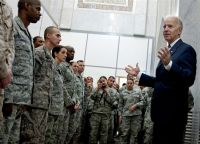WASHINGTON, Dec. 1, 2011 — Troops may be leaving Iraq by year’s end, but meetings yesterday between Vice President Joe Biden and Iraqi leaders promise continuing civilian engagement between the two sovereign nations, a senior administration official said in Baghdad.
After co-chairing a meeting of the U.S.-Iraq Higher Coordinating Committee with Iraqi Prime Minister Nouri al-Maliki, Biden held separate meetings with Maliki, President Jalal Talabani and Speaker Osama al-Nujaifi. “They covered a broad array of issues in these meetings, including the transition to a civilian lead in Iraq for the United States [and] the security relationship going forward,” the official told journalists traveling with the vice president.
“They talked about the resolution of some of Iraq’s remaining international issues,” he added, including obligations under Chapter 7 of the Charter of the United Nations placed on Iraq after its 1990 invasion of and war with Kuwait, and its current relationship with Kuwait.
Biden and the Iraqi leaders, the official said, also discussed regional issues, including those involving Syria, Turkey and Iran.
On the topic of Iran, the vice president “made clear something that we’ve made clear repeatedly, which is, one, we fully expect Iraq to have a relationship with Iran,” the official said.
“There’s a long border and a long history [between the countries],” the official added, “and that is fully understood. But what is not acceptable and not understood would be to in any way allow Iran to use our presence in Iraq as a target.”
The United States has committed in the past not to use Iraq as a staging ground to act against other countries, he said, and that includes Iran.
“Reciprocally,” he added, “it is fully our expectation that the government of Iraq not allow Iraq to be used as an area to target U.S. personnel.”
Biden and the Iraqi leaders also discussed Arab-Kurd relations, internal security — especially the need to keep pressure on violent extremist groups — and Maliki’s visit in Washington with President Barack Obama later this month.
“All of this is very powerful evidence that the United States is not disengaging from Iraq,” the official said. “Rather, the nature of our engagement is changing from what has been a military lead to a civilian lead.”
The United States has “moved, as the vice president put it, from the security agreement that governed our military operations in Iraq to the strategic framework agreement, which is the basis for this comprehensive new relationship.”
As is the case at other embassies around the world, the official added, an Office of Security Cooperation has been established in Iraq to help Iraqis acquire and then learn how to use military equipment they buy from the United States.
In Iraq, that office will include 157 people assigned to the U.S. embassy and under the authority of the ambassador, he said, and some who might come in on individual contracts for two or three months at a time to help the Iraqis train on U.S. equipment.
“What we’re talking about going forward as possibilities of training beyond the Office of Security Cooperation includes things like … doing ongoing training of Iraqis outside of Iraq in other countries [and] integrating Iraqis into regional exercises,” the official added.
Today at Al Faw Palace at Camp Victory, Iraq, Biden spoke at an event hosted by the Iraqi government and held to honor the sacrifices of U.S. and Iraqi forces. “History will record that the liberation of our country was not only an important turning point in Iraq, but it was an important beginning for the region,” Talibani said, referring to events of the Arab Spring.
Maliki thanked former President George W. Bush for signing the U.S.-Iraq status of forces agreement, which established the parameters for U.S. troop withdrawal from Iraq. He also thanked Obama for seeing the agreement through.
“Because of you and the work those of you here have done, we are now able to end this war,” Biden said, adding that the Iraqi people have not and will not yield again to any kind of external domination.
Biden was presented with a medal called a “shield of commitment,” as were Army Gen. Lloyd J. Austin III, commanding general of U.S. Forces Iraq, Jeffrey D. Feltman, assistant secretary of state for near eastern affairs, and ambassadors from other countries who fielded coalition forces.
After the ceremony, Biden met privately with troops for photos before traveling to Erbil in northern Iraq, 50 miles east of Mosul.
There Biden met with Kurdish Regional Government President Masoud Barzani at the official’s ceremonial residence before boarding his aircraft for Ankara, Turkey, the first stop on a four-day trip to Turkey and Greece.
Source:
U.S. Department of Defense
Office of the Assistant Secretary of Defense (Public Affairs)

 von
von 
